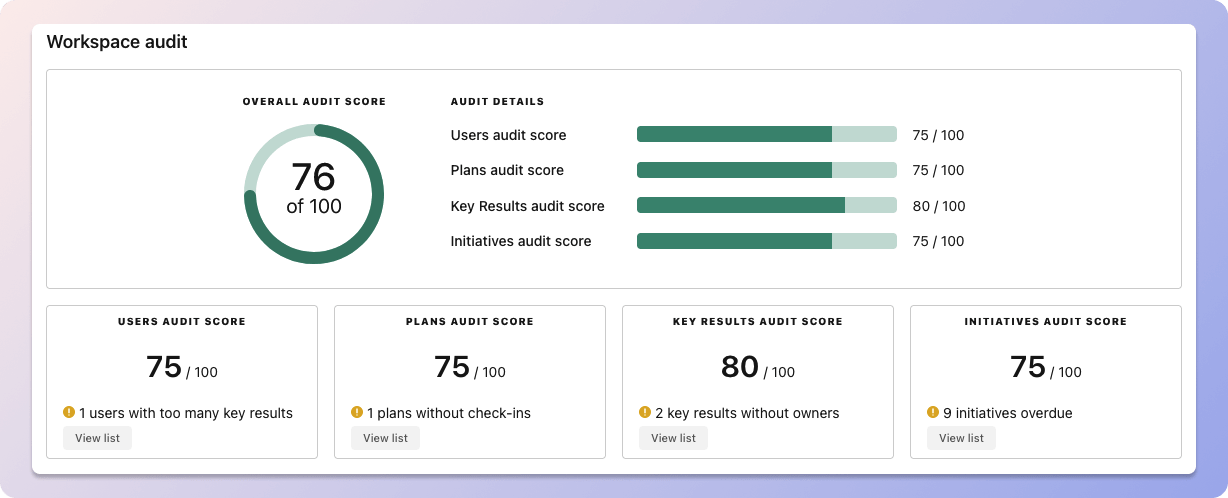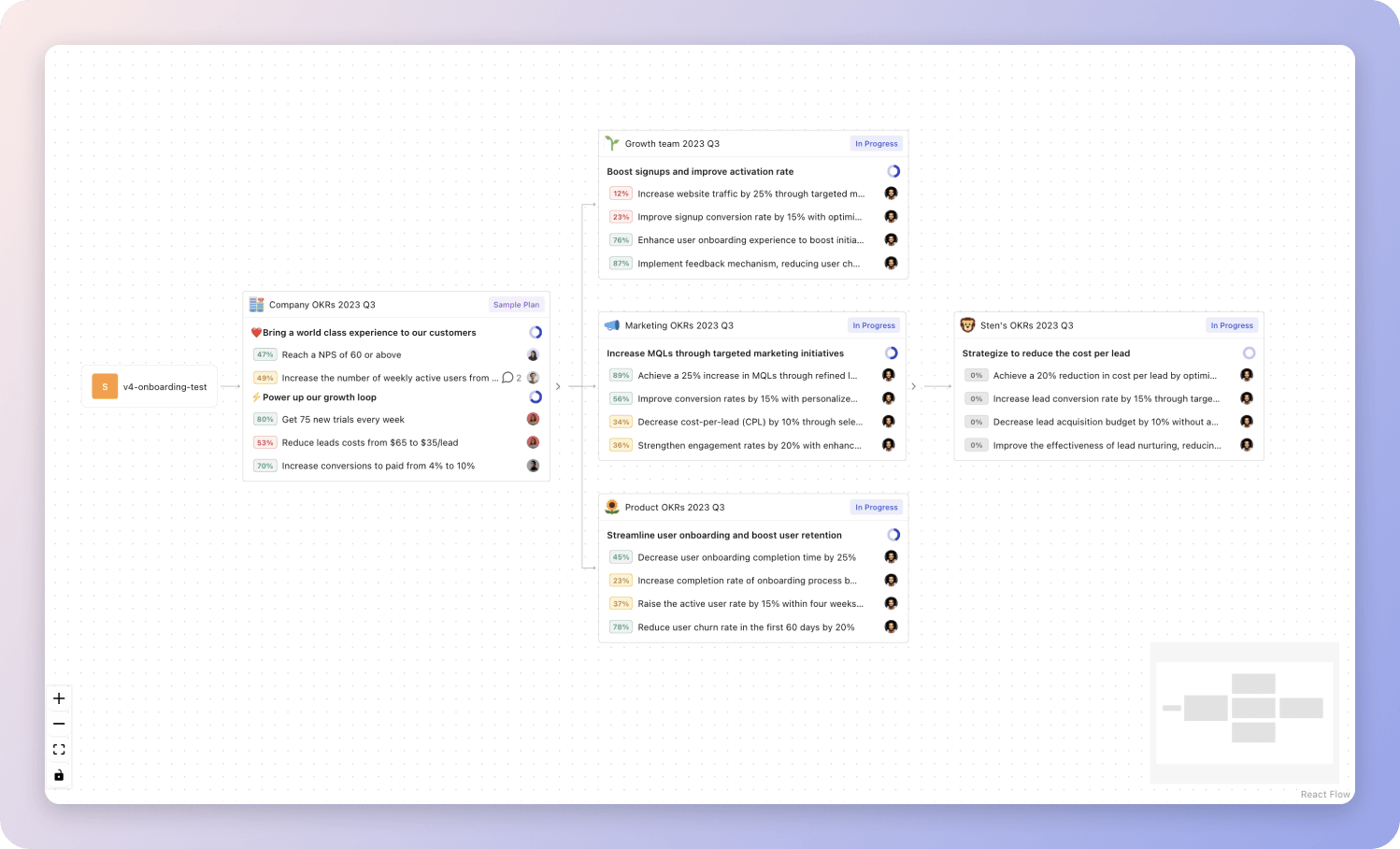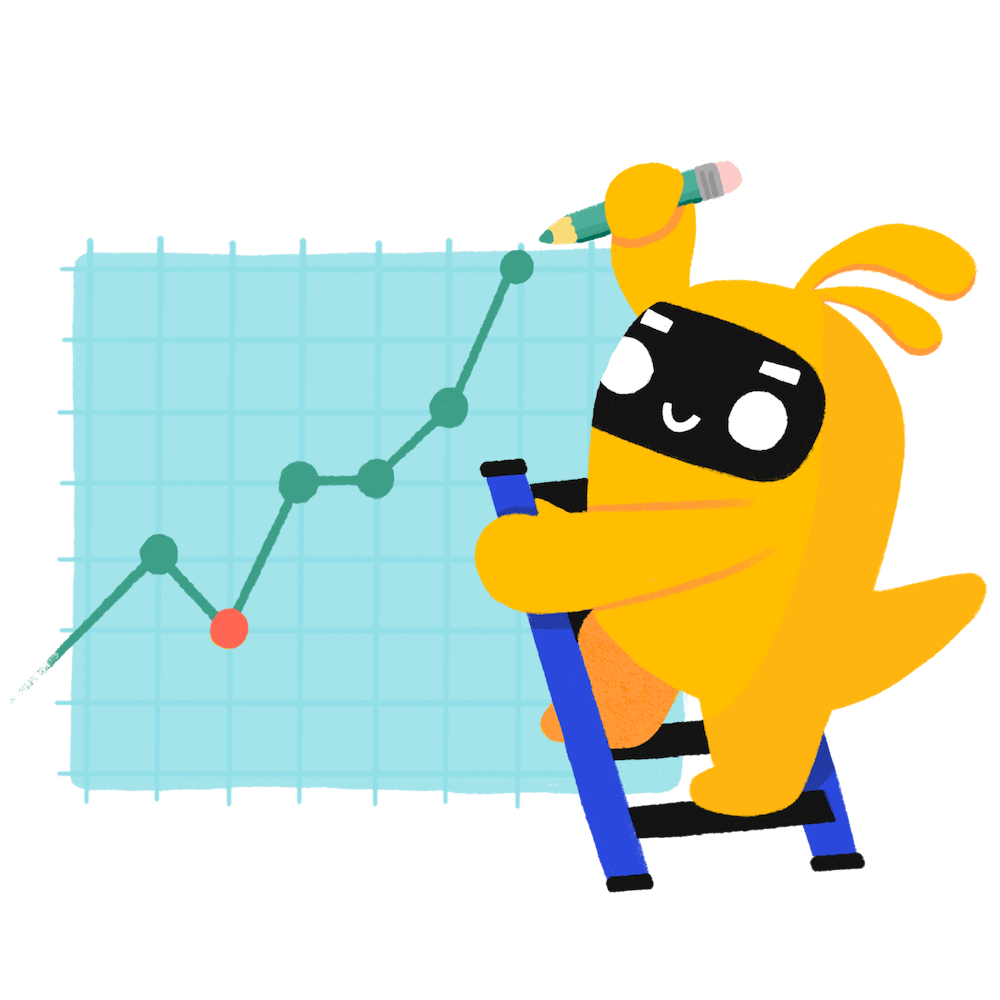2 customisable OKR examples for Online Study Group
What are Online Study Group OKRs?
The Objective and Key Results (OKR) framework is a simple goal-setting methodology that was introduced at Intel by Andy Grove in the 70s. It became popular after John Doerr introduced it to Google in the 90s, and it's now used by teams of all sizes to set and track ambitious goals at scale.
Formulating strong OKRs can be a complex endeavor, particularly for first-timers. Prioritizing outcomes over projects is crucial when developing your plans.
We've tailored a list of OKRs examples for Online Study Group to help you. You can look at any of the templates below to get some inspiration for your own goals.
If you want to learn more about the framework, you can read our OKR guide online.
Building your own Online Study Group OKRs with AI
While we have some examples available, it's likely that you'll have specific scenarios that aren't covered here. You can use our free AI generator below or our more complete goal-setting system to generate your own OKRs.
Feel free to explore our tools:
- Use our free OKR generator
- Use Tability, a complete platform to set and track OKRs and initiatives, including a GPT-4 powered goal generator
Our customisable Online Study Group OKRs examples
You'll find below a list of Objectives and Key Results templates for Online Study Group. We also included strategic projects for each template to make it easier to understand the difference between key results and projects.
Hope you'll find this helpful!
1. OKRs to achieve fluency in English language
Achieve fluency in English language
Hold 30-minute conversations in English thrice a week
Find an English-speaking partner to converse with
Prepare conversational topics for each session
Schedule three specific time slots weekly for English conversations
Complete intermediate level in an online English course
Complete all assignments and exams on time
Dedicate daily time for coursework and studying
Register for an intermediate online English course
Read 10 English books and summarize each
Read one book thoroughly, noting key points
Select and purchase 10 English books of interest
Write a detailed summary of the book
2. OKRs to successfully complete the AI course training
Successfully complete the AI course training
Spend at least 20 hours a week studying AI course material
Review learned topics at the end of each week for reinforcement
Organize materials and pick relevant AI topics before each study session
Allocate four hours daily, five days a week for studying AI
Achieve a passing grade on all AI course quizzes and tests
Study the lecture notes and relevant course material consistently
Regularly participate in AI discussion groups and forums
Complete all AI homework and assignments on time
Submit all assignments on time with satisfaction rate above 90%
Prioritize and schedule time daily for completing assignments
Seek feedback and make necessary improvements before submission
Regularly track and monitor satisfaction rates
Online Study Group OKR best practices to boost success
Generally speaking, your objectives should be ambitious yet achievable, and your key results should be measurable and time-bound (using the SMART framework can be helpful). It is also recommended to list strategic initiatives under your key results, as it'll help you avoid the common mistake of listing projects in your KRs.
Here are a couple of best practices extracted from our OKR implementation guide 👇
Tip #1: Limit the number of key results
The #1 role of OKRs is to help you and your team focus on what really matters. Business-as-usual activities will still be happening, but you do not need to track your entire roadmap in the OKRs.
We recommend having 3-4 objectives, and 3-4 key results per objective. A platform like Tability can run audits on your data to help you identify the plans that have too many goals.
 Tability's audit dashboard will highlight opportunities to improve OKRs
Tability's audit dashboard will highlight opportunities to improve OKRsTip #2: Commit to weekly OKR check-ins
Don't fall into the set-and-forget trap. It is important to adopt a weekly check-in process to get the full value of your OKRs and make your strategy agile – otherwise this is nothing more than a reporting exercise.
Being able to see trends for your key results will also keep yourself honest.
 Tability's check-ins will save you hours and increase transparency
Tability's check-ins will save you hours and increase transparencyTip #3: No more than 2 yellow statuses in a row
Yes, this is another tip for goal-tracking instead of goal-setting (but you'll get plenty of OKR examples above). But, once you have your goals defined, it will be your ability to keep the right sense of urgency that will make the difference.
As a rule of thumb, it's best to avoid having more than 2 yellow/at risk statuses in a row.
Make a call on the 3rd update. You should be either back on track, or off track. This sounds harsh but it's the best way to signal risks early enough to fix things.
How to turn your Online Study Group OKRs in a strategy map
OKRs without regular progress updates are just KPIs. You'll need to update progress on your OKRs every week to get the full benefits from the framework. Reviewing progress periodically has several advantages:
- It brings the goals back to the top of the mind
- It will highlight poorly set OKRs
- It will surface execution risks
- It improves transparency and accountability
We recommend using a spreadsheet for your first OKRs cycle. You'll need to get familiar with the scoring and tracking first. Then, you can scale your OKRs process by using a proper OKR-tracking tool for it.
 Tability's Strategy Map makes it easy to see all your org's OKRs
Tability's Strategy Map makes it easy to see all your org's OKRsIf you're not yet set on a tool, you can check out the 5 best OKR tracking templates guide to find the best way to monitor progress during the quarter.
More Online Study Group OKR templates
We have more templates to help you draft your team goals and OKRs.
OKRs to implement a robust performance measurement system
OKRs to develop a cohesive investor relations strategy for effective fundraising
OKRs to enhance quality assurance abilities and efficiency within team members
OKRs to ascend to a prominent leadership position within the company
OKRs to streamline the company's recruitment process for efficiency and quality hires
OKRs to boost stealth bed and chair pad sales by 20%
OKRs resources
Here are a list of resources to help you adopt the Objectives and Key Results framework.
- To learn: What is the meaning of OKRs
- Blog posts: ODT Blog
- Success metrics: KPIs examples
Create more examples in our app
You can use Tability to create OKRs with AI – and keep yourself accountable 👀
Tability is a unique goal-tracking platform built to save hours at work and help teams stay on top of their goals.
 1 Create your workspace
1 Create your workspace 2 Build plans in seconds with AI
2 Build plans in seconds with AI 3Track your progress
3Track your progress